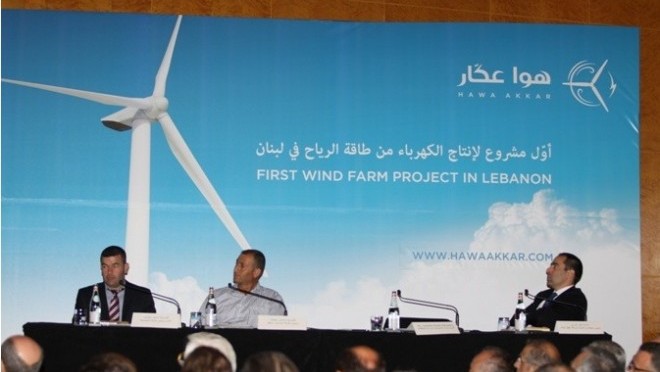The construction of the first wind farms are due to begin “in the next 30 to 60 days” and will be fully operational by summer of next year, chairman of Sustainable Akkar, Salah Tabbarah, told an audience at an EcOrient panel on the second day of the Project Lebanon Wednesday. Situated in Jabal Akroum, in the northeastern Akkar region, the wind farms will have a total output capacity of 180 megawatts that will be sold to state-owned power company Electricite du Liban at the agreed rate of approximately 11.3 cents per kilowatt hour.
Representing the private sector, Sustainable Akkar and two other consortiums, Lebanon Wind Power and Hawa Akkar, entered into a power purchase agreement, Lebanon’s first, in February 2018 in an effort to close an estimated 1 gigawatt gap that exists between current electrical supply and actual demand in the country.
Reforming the electricity sector is one of CEDRE’s main recommendations for revitalizing Lebanon’s debt-ridden economy, where infrastructure development has been hindered for years by political tensions.
Supporting the state-owned power company, EDL has imposed a massive burden on public finances.
Despite the fact that the project will not have met much delay, as then-Energy and Water Minister Cesar Abi Khalil granted the companies 18 months in February 2018 to complete preparations for the farms, the process that led there was not exactly smooth sailing.
Speaking at the “Alternative Energy on the Lebanese Electric Grid” panel, Tabbarah was asked by moderator Hassan Harajli, project manager at Cedro UNDP and AUB lecturer on renewable energy, whether, with all the hardships and obstacles he and his team had encountered, he would take on this project again if he could go back in time.
Tabbarah quipped: “No
[expletive]
way,” although he admitted the know-how he accumulated during the past few years, both on a positive and negative level, would be beneficial when tackling other opportunities to come.
However, Michel Cordahi, chairman of Lebanon Wind Power, was quick to remind Tabbarah that he had often expressed the “national pride” he felt in being part of this project “conducted at a world standard” and that they shared the conviction that their efforts went far beyond the business aspect.
“I guarantee you that you would do it all over again,” Cordahi gently ribbed Tabbarah.
At EcOrient, organized by the European Union under the patronage of Energy and Water Minister Nada Boustani, there was a noticeable discrepancy between the cynicism of the audience and the optimism of the majority of the panelists.
While government representatives, commercial attaches of several European embassies and representatives of the private sector waxed lyrical about the significant progress the government has made in its sustainable energy efforts, many audience members asked critical questions.
However, Boustani’s representative Joseph El Assad, technical adviser to the ministry and the Lebanese Center for Energy Conservation, repeatedly tried to assuage the audience’s cynicism by assuring them the ministry had made significant steps to realizing the lofty goals set in the 2016-2020 National Energy Efficiency Action Plan.
Assad said that, according to a new decree that will soon to be submitted to the Council of Ministers, energy labels for home appliances as well as the installation of solar water heaters and heat pumps will be part of the mandatory requirements for new public constructions.
“The ministry is moving toward mandatory application through legislation,” Assad emphasized. “We need to keep a small positive belief in our government, not focus every time on everything that goes wrong, on all the negative aspects.”
While Assad admitted that there had been “battles and hiccups” along the way, mainly of the political variety, he strongly believes that, based on recently measured qualitative and quantitative indicators, the goal of increased renewable energy of 12 percent by 2020 and 30 percent by 2030 would be reached.
On a broader positive note, the panelists agreed that the wind farm project had, on some level, also contributed to restoring investor confidence in Lebanon, both on a national and an international level.
“This project is a turning point,” Cordahi said. “It is the first time we have a world-class, bankable PPA.”
While Cordahi admitted that financing the project didn’t come without its hardships, due to Lebanon’s bad credit rating and other indicators of its economy’s instability, those “day to day fights” with lenders were now behind them.
“We are actually oversubscribed [when investor supply exceeds demand] on this project. They believe in the new energy plan.”
The Daily Star
By Farah-Silvana Kanaan, The Daily Star


